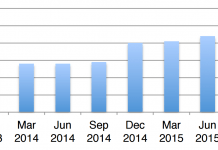 TheBookseller.com reports that the Booksellers Association of England and Ireland is expressing concern over the results of a British library review that has proposed a ban on libraries charging for e-book lending.
TheBookseller.com reports that the Booksellers Association of England and Ireland is expressing concern over the results of a British library review that has proposed a ban on libraries charging for e-book lending.
The BA noted the “undeniable tension” between the library world and the publishing/bookselling world, given that libraries exist to give away information for free and the latter exist to earn a living.
Meanwhile, the Publishers Association has come out in favor of ready access to books whether physical or electronic, and the president of the Society of Chief Librarians says that library reading of any book should not be a charged-for service.
I will admit that I am not entirely familiar with the way British libraries work. I know that, unlike American libraries, they pay a fee to authors for each lending of their books, and I presume that would apply to e-books as well. And of course for libraries that had not been set up to deal with e-books, there would be technical costs in launching and maintaining e-book systems.
I’m still a bit surprised that libraries would think of charging for e-book lending, as that would seem to me to blur the line between libraries and booksellers—especially if you’re paying to check out an e-book that gets checked back in after a set period of time.
Related:

































Dallas, where I used to live, started a program where they charge for lending paper books–making new books available for a fee before turning them to the stacks. With today’s aversion to paying taxes and all the cuts in service cities have been forced to make, surely it isn’t right to require libraries not to explore models for covering a share of their costs.
Rob Preece
Publisher
Lots of libraries in the U.S. have a section for rental books which are the current “hot” titles, both fiction and non-fiction. The same libraries also have a copy or copies in the regular free section of the library and of course you can put a reserve on one of those. Likely you will wait longer than with the rentals. Since my own library does not do rentals, I have no way of knowing how well these rentals move. Maybe someone whose library currently does this can weigh in.
The only really scary thing about libraries charging for the use of content, is that it could make them another aggregator — but a more confusing one, because certainly some of the resources they offer would remain accessible free of charge. So there could be a feeling of ‘bait and switch’ whenever a patron discovered that they have to pay to read something. But it seems like it would be acceptable, as long as rental money were used to purchase the item. Contrary to popular assumption, libraries are not free. They are a pre-paid service. If my library charges me to read something they purchased with my tax money, I’m likely to get testy.
I think that the ‘rental’ print copies of bestsellers one sees at one’s public library follow a different model. Libraries’ rental books are not generally actually owned by the library. I believe that they are most commonly a temporary holding to be returned to the renting agency when the demand has cooled down. This enables libraries to continue to satisfy reader demand without being stuck with 25 copies of ‘The Lost Symbol’ after the whole world has finished reading it. In theory, it *could* be a profit center, but I doubt that would be common, as rentals are likely extra high-maintenance — for example, if a patron loses or damages a copy.
That said, there’s no reason why a similar arrangement for e-books couldn’t be struck. Of course, the library would then be a lot more like Elsevier than like the library; but if fees were nominal, and the patron could perhaps specify the rental period up-front — i.e. pay 10x the weekly fee to have use of a particularly long text for 10 weeks instead of 3 — it *could* work ok.
I’m just not sure what happens to those on a fixed income, and our low-income neighbors in that scenario.